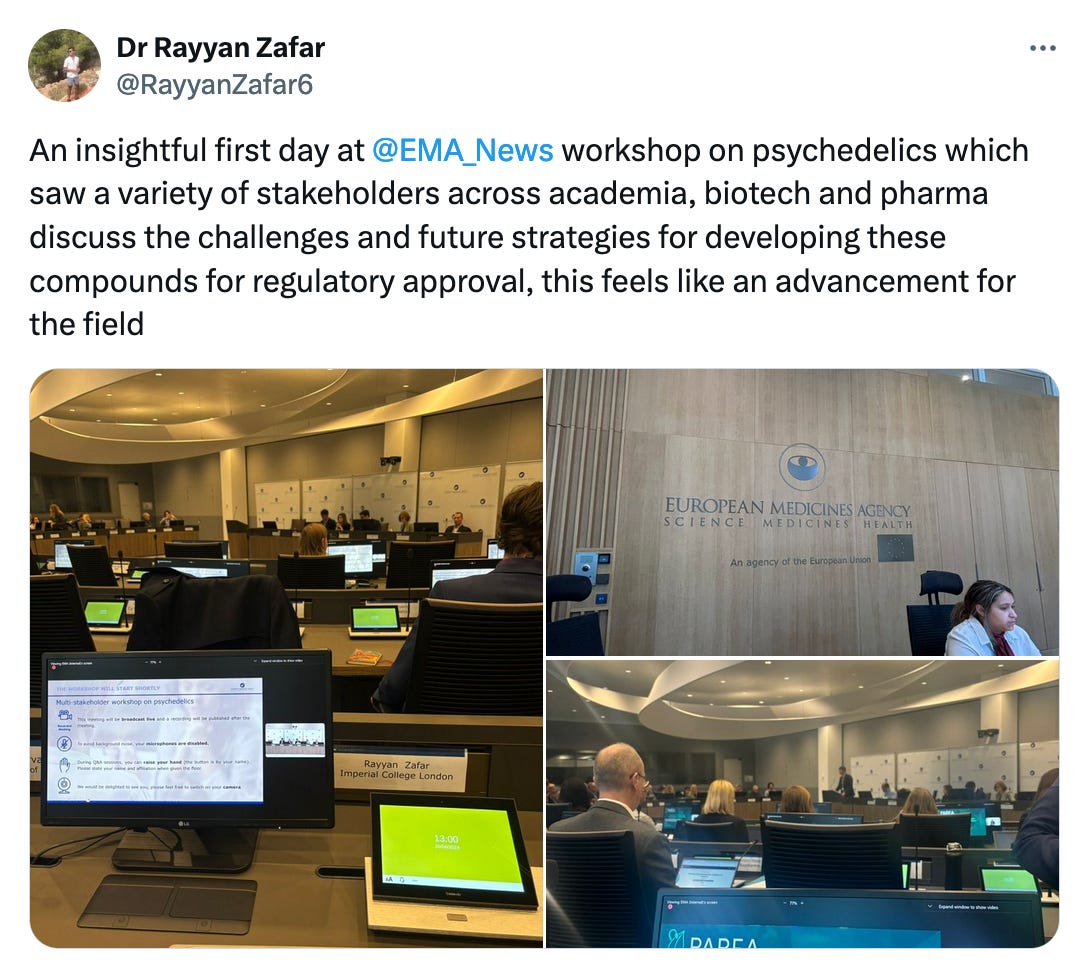No serious adverse reactions recorded in synthetic 5-MeO-DMT study; California psychedelics bill advances; Are medical trainees ready for psychedelics?
Plus: European Medicines Agency holds psychedelics workshop and psilocybin improves psychological flexibility
Happy Friday and welcome back to The Microdose, an independent journalism newsletter brought to you by the U.C. Berkeley Center for the Science of Psychedelics.
No serious adverse reactions recorded in synthetic 5-MeO-DMT study
This week, UK researchers published results from a phase 1 study investigating the safety of BPL-003, a formulation of 5-MeO-DMT developed by Beckley Psytech, a UK-based psychedelic drug development company. 5-MeO-DMT is a psychoactive molecule that appears naturally in secretions of a toad found in the southwestern U.S. and northwestern Mexico. BPL-003 is a lab-made synthetic version of the drug, which was given to participants through the nose.
The research, published in the Journal of Psychopharmacology, followed 44 participants who reported having never taken psychedelics before. The researchers divided up the participants into seven cohorts, each of which received either a dose of BPL-003 or a placebo. According to the researchers, no participants reported suicidal thoughts or behaviors during the study and did not display any symptoms consistent with PTSD or lingering hallucinations when assessed a week after receiving their BPL-003 dose. However, about half of the participants had at least one adverse event; the most common were nasal discomfort after taking the drug (10), nausea (7), and vomiting (5), but symptoms “did not appear to correlate with the dose,” the authors wrote. The dose ranged from 1 to 12 mg and, unsurprisingly, higher doses were correlated with more intense experiences, as measured by participants’ responses on the Mystical Experience Questionnaire and the Ego Dissolution Inventory. Overall, the researchers conclude that the synthetic version of the drug “might be suitable for further pharmaceutical development.”
California’s psychedelics bill advances
On Tuesday, the California Senate Business, Professions, and Economic Development Committee passed Senate Bill 1012, a bill that would create a state-regulated program to oversee therapeutic uses of psilocybin, MDMA, DMT, and mescaline (excluding peyote). The bill was introduced by state senators Scott Wiener (D) and Marie Waldron (R) in February in response to Governor Newsom’s veto of Wiener’s previous psychedelics bill. At the time of the veto, Newsom encouraged the senate to introduce psychedelic legislation that focused on therapeutic use of the drugs. In its consideration of the bill, the Business, Professions, and Economic Development Committee amended it to require that would-be facilitators in any state-regulated program have a professional license in a health field, such as psychiatry, social work, or nursing. The bill now heads to the Senate Public Safety Committee.
Want the latest psychedelics news? Subscribe! (It’s free!)
Are medical trainees ready for psychedelics?
With the U.S. Food and Drug Administration months away from deciding whether MDMA-assisted therapy should be approved for medical use in treating PTSD, and more states considering regulated psychedelic programs, there could soon be heightened demand for psychedelic-assisted therapy. But according to data published in The Journal of Psychoactive Drugs this week, medical trainees are “unprepared for advances in psychedelic medicine.” Researchers at the University of Michigan, Wayne State, and SUNY Buffalo analyzed survey results from over 200 trainees in programs in medicine, pharmacy, psychology, social work, and biological science. Only 10 percent reported receiving any training in psychedelic medicine or psychotherapy, and most reported that their knowledge about psychedelics came from word of mouth, social media, or popular media.
Participants were also asked 12 questions to assess their knowledge of psychedelics. Questions included, “What is the main psychoactive ingredient in ayahuasca?” and “Under which category are psychedelic drugs scheduled in the United States?” Over a quarter of participants answered none of the questions correctly, and the average score was 31 percent. “The survey indicated that overall knowledge surrounding psychedelic science and medicine is quite low,” the authors wrote. In considering these results alongside another recent study showing that nearly 80 percent of psychiatrists said they’d been asked about psychedelic-assisted therapies by patients or families, the researchers note that a lack of knowledge could stymie the development of psychedelic therapies. “Lack of adequate knowledge among trainees carries the risk of creating biases and prejudices against these novel treatments and could result in a decreased number of adequately trained medical professionals who are able to carry out psychedelic-assisted therapies,” they write.
European Medicines Agency holds psychedelics workshop
This week, the European Medicines Agency, which evaluates and supervises the safety of pharmaceutical products in the European Union, held a two-day meeting in Amsterdam to discuss the development of psychedelic therapies. Blossom, a psychedelic research website, published an in-depth review of the meeting, in which regulators from Canada, the U.S., Australia, and across the European Union discussed issues including clinical trial design and assessing efficacy of treatment. Patient advocacy groups and drug developers also shared the challenges they foresee. Australia’s Therapeutic Goods Administration’s chief medical advisor Robyn Langham presented on the agency’s recent decision to allow authorized psychiatrists to prescribe MDMA and psilocybin; Langham told attendees that nine psychiatrists have been authorized since the agency’s rules took effect last summer.

New study: psilocybin improves psychological flexibility
While clinical trials have shown psilocybin can help decrease depression, PTSD, and anxiety symptoms in some participants, the exact mechanisms are still unknown. In a paper published in Scientific Reports on Wednesday, researchers at Yale and NYU investigated the theory that psilocybin works because it induces psychological flexibility, a set of traits that encompass factors like people’s openness to experience, being mindful, and living in accordance with one’s values. In their study, researchers measured participants’ psychological flexibility over 16 weeks via a series of standard surveys. Over that time, participants each underwent two dosing sessions accompanied by psychotherapy: a first in which they were given a placebo, followed by second sessions two weeks later in which they received a moderate dose of psilocybin. Participants’ psychological flexibility significantly increased and depression symptoms decreased after taking psilocybin, and those changes persisted for three months after the psilocybin dosing session.
Oklahoma ABC affiliate KSWO reviews the state’s future with psychedelics and notes that state senator Daniel Pae (R), who introduced a 2023 bill to establish psilocybin research, has been in touch with universities in the state to discuss starting psilocybin clinical trials. The bill passed the house during last year’s legislative session and now awaits Senate approval.
Some attendees of the Tribe of Nova music festival in Israel were on psychedelics when Hamas attacked festival goers on October 7. Now, researchers at the University of Haifa are studying how psychedelics might have affected survivors’ experiences, The New York Times reports.
In the Regulatory Review, a publication of the University of Pennsylvania Program on Regulation, scholars have published essays giving overviews of regulatory issues in psychedelics, including how they will be reimbursed by insurers and risks of recreational use.
You’re all caught up! Have a great weekend. We’ll be back in your inbox on Monday with a new issue of 5 Questions.
If you know anyone who might like the latest on psychedelics in their inbox, feel free to forward this to them, or click below.
Got tips? Email us at themicrodose@berkeley.edu.








